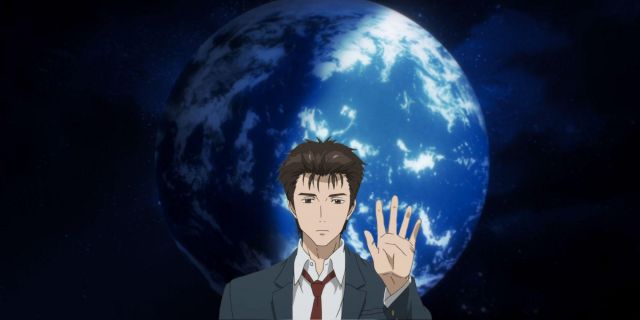The impact of the messages conveyed throughout the series Parasyte: The Maxim is undeniable. Upon reaching the end of the series, viewers often feel a new or heightened sense of appreciation for non-human life and the world around them. Not unlike the protagonist, Shinichi Izumi, fans recognize the value of the lessons taught by the parasites during the time they spent inhabiting human bodies on Earth. Both the explicit and implicit themes revealed as the plot progresses hint at real-life opposing environmental philosophies.
By showing the diversity of interspecies relationships, the three basic perspectives of environmental philosophy, including biocentrism, anthropocentrism and ecocentrism, are presented. Each philosophy is central to thinking about humanity’s relationship with other life and nature. It’s important to note the philosophy that aligns closest to Shinichi’s adopted worldview at the conclusion of the series is biocentrism. His experience serving as the host for the parasite, Migi, leads him to eventually change his perspective of reality to one that does not center around human beings.
Shinichi’s Shift From Anthropocentrism to Biocentrism Indicates His Character Growth

Biocentrism, defined as the view or belief that human rights and needs are not superior to those of other living beings, is a philosophy that emphasizes the inherent value of individual organisms. A key step to Shinichi gaining this ethical perspective was his journey to fully understanding what it means for something to have value. Instrumental value is measured by how valuable one thing is to another, while inherent or intrinsic value is independent of the value derived from the relation of one thing to another. In other words, organisms that serve a purpose for humanity are considered instrumentally valuable, and anything with value “for itself” is considered intrinsically valuable.
Shinichi’s acceptance of the biocentric ideology that all life deserves equal moral consideration occurred in the end when he realized that instrumental and intrinsic value are not mutually exclusive. Biocentrism is acknowledged by many as the best approach to environmental conservation, as the philosophy is seemingly the most realistic and practical of the three. Unlike ecocentrism, the emphasis is placed on distinct individual organisms that make up an ecosystem rather than some abstraction of an entire species or population. Also, unlike the anthropocentric view that nature only has instrumental value, biocentrism doesn’t fail to capture the intrinsic value of the natural world.
Prior to his character growth, Shinichi was blind to the flaws of the anthropocentric worldview he shared with the vast majority of society. An anthropocentric viewpoint ignores or treats the natural world as incidental, with a primary or exclusive focus on people. Parasyte: The Maxim delves deeply into this idea as the parasites in the series continuously question humans about their self-centered worldview.
The Opposing Philosophical Views of Humans and Parasites

In anthropocentrism, humans are valued more highly than nature, which is considered to only have instrumental value, meaning the natural world is valued merely for its usefulness and functionality. From this philosophical perspective, nature is typically considered an object of study and usage, with humans being seen as distinct from and even transcendent to it. The anthropocentric basis for Shinichi’s morals was shown through his disgust toward the alien species’ blatant disregard for the existence of humans and human emotion.
Conversely, the parasites perceived the lives of humans to be just as irrelevant and disposable as the lives of animals are to humans. The introduction of parasites’ ecocentric views is what triggered the development of Shinichi’s character. In a way, the series challenges the significance of human life in order to encourage viewers to think about the relevance of non-human lives. When examining human effects on the animals that we eat, this can be directly applied.
Abiotic components like rivers and abiotic element-containing systems like ecosystems and watersheds are frequently included in ecocentric viewpoints. Ecocentric thinkers frequently take a more holistic perspective, placing value on individual species, ecosystems or the entire planet. Individuals have worth because they are part of larger wholes like species, ecosystems or the planet. Value is inherently found in these larger wholes.
All Things Are Good In Moderation, Even Environmentalism

Parasyte: The Maxim is a series that is self-aware and very cognizant of science and the reality of how humans affect life on Earth. It undoubtedly aims to raise awareness and acceptance of environmentalism among viewers. With that being said, the series also demonstrates that while environmentalism has some merits due to its scientific and real-world roots, if carried too far, it simply devolves into ecoterrorism.
The introduction of Takeshi Hirokawa, an eco-terrorist in the series, serves as a prime example of how extreme environmentalists with ecocentric views not based on practicality can become radical. Hirokawa contends that nonhuman life should be treated equally with humans and that as a result, the population must be reduced in order to lessen human impact on the biosphere. His character is meant to show that while anthropocentric views can be harmful, ecocentrism has the potential to be equally dangerous if the moral considerations of the philosophy become skewed or used as justification for unethical actions.
Through existential themes and a showcase of complex interspecies relationships, Parasyte: The Maxim effectively explores the three basic perspectives of environmental philosophy: anthropocentrism, biocentrism and ecocentrism. Viewers are called to question the ethics behind each of the philosophies and determine whether humanity truly has intrinsic value. Fans can agree that, much like Shinichi, the audience is taken on an adventure of self-reflection, and by the end, a better understanding of humanity’s role in and relationship with nature is reached.















Leave a Reply